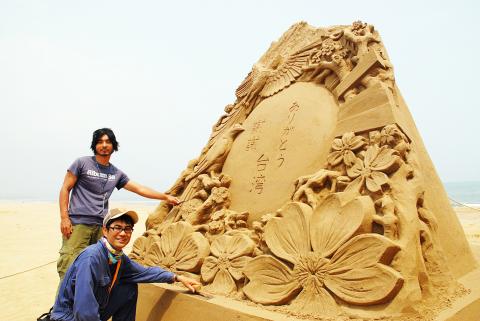Taiwan has donated more money to earthquake-stricken Japan than any other country or region in the world, surprising the Japanese and making them realize that Taiwanese are true friends, a Japanese magazine reported in its latest issue.
The Shukan Shincho, a weekly magazine issued every Thursday, also ran a photo showing President Ma Ying-jeou (馬英九) soliciting donations for Japan on TV.
The report said more than 130 countries and regions have come to the aid of Japan in the wake of the March 11 earthquake and tsunami, such as the US, which has not only donated money, but also mobilized about 18,000 soldiers for assistance.

Photo: Wu Liang-yi, Taipei Times
In addition, Afghanistan, one of the poorest countries in the world, has donated ¥82 million (US$1 million), and many relatively poor countries in Africa, such as Sudan, had also contributed funds.
SURPRISED
However, what surprised the Japanese the most was the helping hand extended by Taiwan, the report said.
Taiwan has sent a rescue team and relief goods, and as of April 1, its Red Cross Society had solicited ¥10.99 billion in donations, up to 90 percent of which came from private donors.
Though it has a population of only 23 million, Taiwan has donated even more than the US, the report said.
PAST ACTIONS
The reports also cited a Japanese reporter stationed in Taiwan who said Taiwanesee had not forgotten the goodwill shown by Japan in the wake of Taiwan’s devastating on Sept. 21, 1999 earthquake that left more than 2,000 people dead.
Japan sent a 145-member rescue team and donated NT$1.1 billion (US$37 million) in funds to Taiwan after that natural disaster.
The magazine also cited diplomatic commentator Masahiro Miyazake’s observation that Japan’s pro-China political figures and media have not treated Taiwan well.
Even former President Lee Teng-hui (李登輝) sent encouraging messages to quake-affected victims, but pro-China media has barely acknowledged Taiwan’s support, he said, observing that true friends are those who are there in difficult times.
APPRECIATION
Meanwhile, Japanese travel agency H.I.S. Co also ran a full-page ad in the largest-circulated newspaper Yomiuri Shimbun to express appreciation to Taiwan.
The ad said Taiwan sent a rescue team and relief goods, and the Red Cross Society had collected ¥11.01 billion as of Tuesday.

A preclearance service to facilitate entry for people traveling to select airports in Japan would be available from Thursday next week to Feb. 25 at Taiwan Taoyuan International Airport, Taoyuan International Airport Corp (TIAC) said on Tuesday. The service was first made available to Taiwanese travelers throughout the winter vacation of 2024 and during the Lunar New Year holiday. In addition to flights to the Japanese cities of Hakodate, Asahikawa, Akita, Sendai, Niigata, Okayama, Takamatsu, Kumamoto and Kagoshima, the service would be available to travelers to Kobe and Oita. The service can be accessed by passengers of 15 flight routes operated by

Alain Robert, known as the "French Spider-Man," praised Alex Honnold as exceptionally well-prepared after the US climber completed a free solo ascent of Taipei 101 yesterday. Robert said Honnold's ascent of the 508m-tall skyscraper in just more than one-and-a-half hours without using safety ropes or equipment was a remarkable achievement. "This is my life," he said in an interview conducted in French, adding that he liked the feeling of being "on the edge of danger." The 63-year-old Frenchman climbed Taipei 101 using ropes in December 2004, taking about four hours to reach the top. On a one-to-10 scale of difficulty, Robert said Taipei 101

MORE FALL: An investigation into one of Xi’s key cronies, part of a broader ‘anti-corruption’ drive, indicates that he might have a deep distrust in the military, an expert said China’s latest military purge underscores systemic risks in its shift from collective leadership to sole rule under Chinese President Xi Jinping (習近平), and could disrupt its chain of command and military capabilities, a national security official said yesterday. If decisionmaking within the Chinese Communist Party has become “irrational” under one-man rule, the Taiwan Strait and the regional situation must be approached with extreme caution, given unforeseen risks, they added. The anonymous official made the remarks as China’s Central Military Commission Vice Chairman Zhang Youxia (張又俠) and Joint Staff Department Chief of Staff Liu Zhenli (劉振立) were reportedly being investigated for suspected “serious

Taiwanese and US defense groups are collaborating to introduce deployable, semi-autonomous manufacturing systems for drones and components in a boost to the nation’s supply chain resilience. Taiwan’s G-Tech Optroelectronics Corp subsidiary GTOC and the US’ Aerkomm Inc on Friday announced an agreement with fellow US-based Firestorm Lab to adopt the latter’s xCell, a technology featuring 3D printers fitted in 6.1m container units. The systems enable aerial platforms and parts to be produced in high volumes from dispersed nodes capable of rapid redeployment, to minimize the risk of enemy strikes and to meet field requirements, they said. Firestorm chief technology officer Ian Muceus said